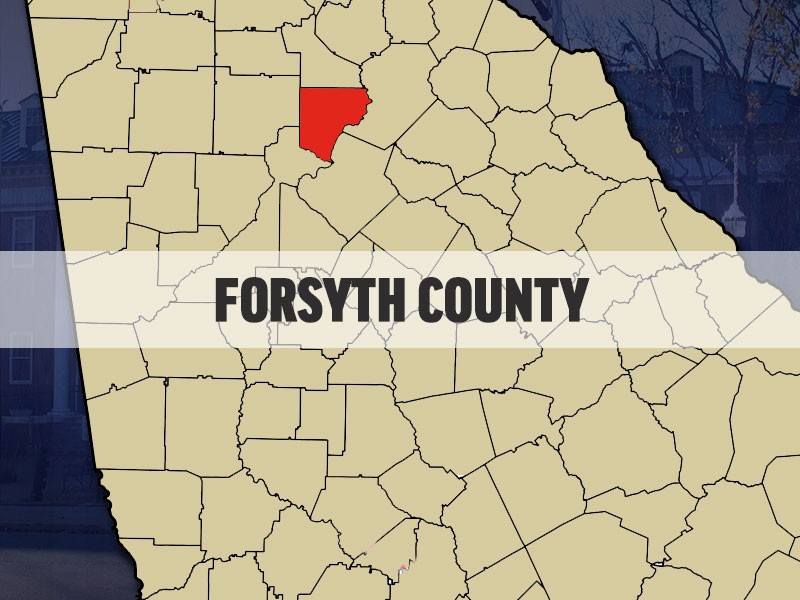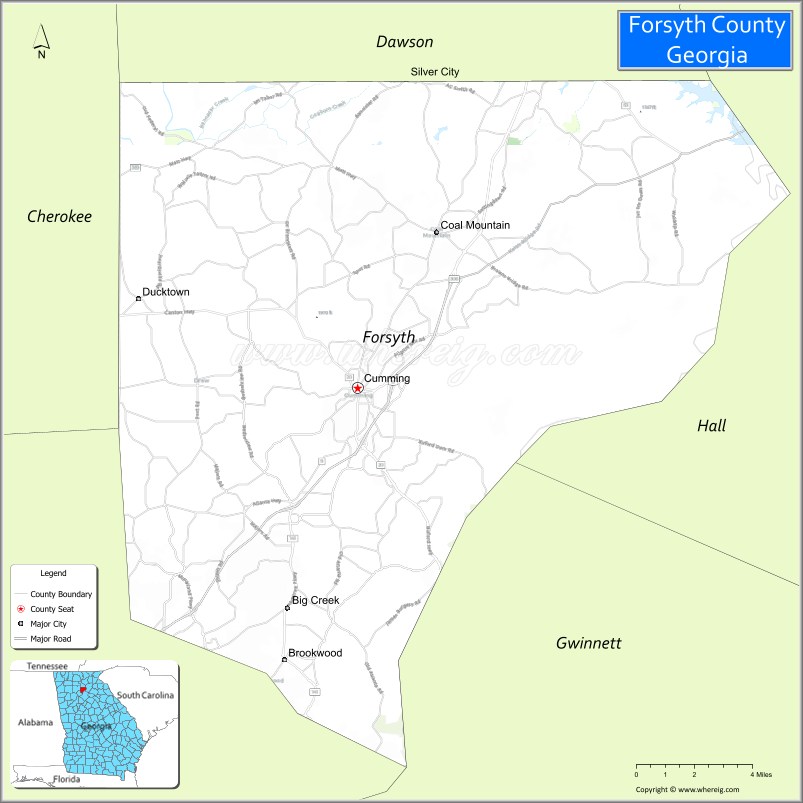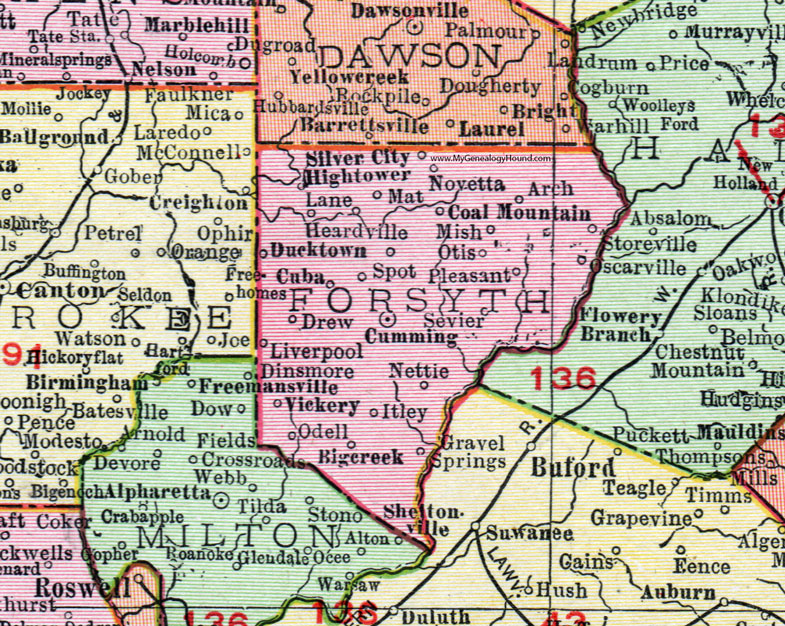Navigating Forsyth County, Georgia: A Comprehensive Guide
Related Articles: Navigating Forsyth County, Georgia: A Comprehensive Guide
Introduction
In this auspicious occasion, we are delighted to delve into the intriguing topic related to Navigating Forsyth County, Georgia: A Comprehensive Guide. Let’s weave interesting information and offer fresh perspectives to the readers.
Table of Content
Navigating Forsyth County, Georgia: A Comprehensive Guide

Forsyth County, nestled in the north of metropolitan Atlanta, Georgia, is a vibrant community experiencing rapid growth. Its strategic location, diverse landscape, and thriving economy attract residents and visitors alike. Understanding the layout of Forsyth County is crucial for navigating its various attractions, services, and communities. This comprehensive guide delves into the intricacies of Forsyth County’s map, highlighting its significance and offering practical insights for exploration.
The Geographic Landscape: A Tapestry of Diversity
Forsyth County boasts a unique geographical tapestry, encompassing rolling hills, scenic forests, and picturesque lakes. This diverse landscape is a testament to its rich history, shaped by the Chattahoochee River and its tributaries. The county’s terrain plays a pivotal role in its development, influencing everything from transportation infrastructure to recreational opportunities.
Understanding the Map: Key Features and Landmarks
Forsyth County’s map is a visual representation of its intricate network of roads, neighborhoods, and points of interest. It serves as a valuable tool for residents, visitors, and businesses alike. Let’s explore some of its key features:
- Major Highways: The county is conveniently connected to Atlanta and other major cities via Interstate 85, Georgia Highway 400, and Georgia Highway 369. These arteries facilitate commuting, commerce, and tourism.
- Neighborhoods: Forsyth County comprises a diverse array of neighborhoods, each with its unique character and amenities. From the established communities of Cumming and Sugar Hill to the newer developments in the south, the map provides a clear visual of the county’s residential landscape.
- Points of Interest: Forsyth County offers a wealth of attractions, including parks, museums, historical sites, and shopping centers. The map highlights these locations, enabling visitors to plan their itinerary and explore the county’s cultural and recreational offerings.
- Schools and Educational Institutions: The county is renowned for its excellent school system, with numerous public and private schools serving students of all ages. The map showcases the locations of these institutions, providing valuable information for families seeking educational opportunities.
- Hospitals and Healthcare Facilities: Forsyth County is home to several hospitals and healthcare facilities, ensuring access to quality medical care for its residents. The map identifies these locations, providing crucial information for emergencies and routine healthcare needs.
The Importance of the Forsyth County Map:
The Forsyth County map is more than just a visual representation of the county’s geography. It serves as a vital tool for:
- Navigation: The map provides a clear and concise guide for navigating the county’s roads and highways, making travel efficient and stress-free.
- Planning: Whether planning a family outing, a business trip, or a simple grocery run, the map facilitates informed decision-making by highlighting important locations and amenities.
- Community Engagement: The map fosters a sense of community by providing a visual representation of the county’s diverse neighborhoods, schools, and recreational facilities, encouraging residents to explore and engage with their surroundings.
- Economic Development: The map serves as a valuable tool for businesses looking to establish a presence in Forsyth County. It showcases the county’s infrastructure, population demographics, and available land, providing crucial information for informed investment decisions.
FAQs: Exploring the Nuances of Forsyth County
1. What are the most popular attractions in Forsyth County?
Forsyth County boasts a plethora of attractions, including the Cumming Fairgrounds, the Forsyth County Library System, the Sawnee Mountain Preserve, and the Lanier Islands Resort. These locations offer diverse experiences, catering to various interests and age groups.
2. What are the best neighborhoods for families in Forsyth County?
Forsyth County offers a variety of family-friendly neighborhoods, each with its unique charm and amenities. Some popular choices include the established communities of Cumming, Sugar Hill, and Johns Creek, known for their excellent schools, parks, and recreational facilities.
3. What are the major employers in Forsyth County?
Forsyth County is home to a diverse range of industries, with major employers including Northside Hospital Forsyth, the Forsyth County Government, and several Fortune 500 companies. The county’s strategic location and thriving economy attract businesses across various sectors.
4. How is Forsyth County addressing its rapid growth?
Forsyth County is actively addressing its rapid growth by investing in infrastructure improvements, expanding its transportation network, and implementing smart growth policies to preserve its natural resources and quality of life.
5. What are the best ways to explore Forsyth County?
Forsyth County offers various ways to explore its diverse landscape and attractions. Visitors can enjoy scenic drives along the Chattahoochee River, explore the county’s numerous parks and trails, or take a leisurely stroll through its charming downtown areas.
Tips for Navigating Forsyth County:
- Utilize online mapping tools: Online mapping services like Google Maps and Apple Maps provide comprehensive and interactive maps of Forsyth County, offering real-time traffic updates, directions, and points of interest.
- Download a local map: Consider downloading a physical map of Forsyth County for offline use, especially when traveling in areas with limited internet connectivity.
- Explore the county’s website: The Forsyth County website provides a wealth of information about the county, including its history, demographics, attractions, and services.
- Engage with local resources: Consult with local visitor centers, chambers of commerce, and community organizations for personalized recommendations and insights into the county’s unique offerings.
Conclusion: A County on the Rise
Forsyth County, Georgia, is a thriving community with a rich history, diverse landscape, and promising future. Its map serves as a valuable tool for navigating its attractions, services, and communities, providing a clear understanding of its layout and key features. As the county continues to grow and evolve, its map will remain an essential resource for residents, visitors, and businesses alike, facilitating exploration, connection, and informed decision-making.








Closure
Thus, we hope this article has provided valuable insights into Navigating Forsyth County, Georgia: A Comprehensive Guide. We appreciate your attention to our article. See you in our next article!